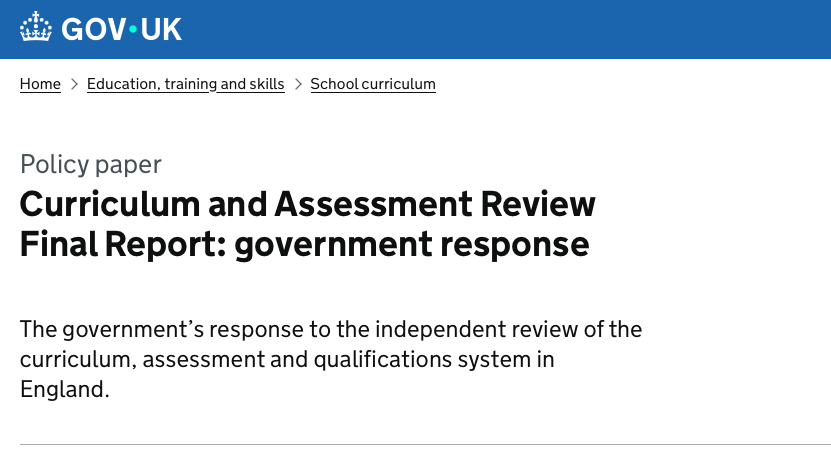
Welcome to our blog. The government response to the curriculum review has taken up a lot of airtime since it was published. In this blogpost we focus passages relating to reading and literacy, pulling out an abridged list of the report passages focused on reading.
The Importance of Reading
On pages 5 and 16 we find general, positive statements about the importance of reading. Nothing we can't get behind here:
A love of reading will help young people navigate an uncertain world where fiction is too often dressed up as fact. The ability to read well exposes young people to the joy of being transported to another world and is essential for accessing the school curriculum. Reading expands young people's imagination, exposes them to new ideas and challenging perspectives and can foster creativity. (Pages 5, 16)
National Year of Reading
To highlight the importance of reading, the government will make 2026 the 'national year of reading.' What this means in practice we will have to see:
We are making 2026 the National Year of Reading. (Page 16)
Current Reading Standards and Ambition for Phonics Screening Check
Trailed in the weeks leading up to the response, the new target of 90% to pass the phonics screening check by the end of year 1 is no surprise:
Currently, 20% of children are not reaching the standard of the phonics screening check at the end of Year 1, and an even higher proportion (25%) do not go on to meet the expected standard in reading at Key Stage 2.
We are setting an ambition for 90% of children to meet the expected standard in the Phonics Screening Check by the end of Year 1. (Page 16, 17)
Systematic Synthetic Phonics
Business as usual on the phonics front:
We will reinforce our expectation that all primary schools use a systematic synthetic phonics programme and ensure staff are kept up to date with the necessary training and resources. Programmes will be required to give schools the tools and training they need to identify children at risk of falling behind and act early to give them extra support. (Page 17)
Reading Ambition for All Programme
To improve reading outcomes, the government is to focus on increasing the reach of its 'Reading Ambition for All' CPD programme. This consists of 5 modules - all of the English Hubs have information, see here for example:
To further drive improvements for the 20% of children who currently do not pass the phonics screening check and need additional support, we will double the reach of our Reading Ambition for All continuous professional development programme to over 1,300 primary schools from academic year 2026/27. This programme helps children with SEND to access phonics, supporting the development of their reading skills. (Page 17)
Reading Fluency Training
Reading in secondary gets some attention, with the new year 8 reading test coming in. Here the response outlines the importance of fluency, promising new reading training for secondary teachers from January:
We will train more teachers to support children's reading fluency — the essential bridge between phonics and comprehension — reaching over 600 schools this year. All secondary teachers will have access to new reading training from January 2026, and we plan to reach at least 75% of secondary literacy leads by the end of the 2025–2026 academic year. (Page 17)
Early Years Support
The reemergence of Sure Start but with a new name, the government has a focus on early years and in particular disadvantage in early years:
Building on the Best Start in Life Strategy, we will raise standards in the early years by boosting access to high-quality early education and care, and supporting families via Best Start Family Hubs to develop children's language and learning at home. New training and development for reception year teachers will support the ambition for 90% of children to meet the phonics screening standard. From September 2026 we are expanding RISE English Hub support for reception-aged children, focusing on reading, writing and early language through training and funding. (Pages 9, 17)
Key Stage 3 Focus and New Statutory Reading Test
Discussed at length in the press in the weeks before the government response:
Weaknesses in reading are most critical to resolve in the first years of secondary school, since reading is the fundamental skill that enables access to the whole curriculum. Every secondary school should be equipped to identify pupils who need support and put effective interventions in place so they can access Key Stage 3 and be prepared for success at Key Stage 4.
We will introduce a new statutory reading test for all children to be taken in Year 8, designed to check both fluency and comprehension. School-level results will not be published; however, individual schools will receive their pupils' results and can access national, regional, and local authority data to benchmark performance. (Page 20)
Key Stage 4 English
The review suggested some consderable changes to the KS4 English programme of study. On literary heritage:
Literary Heritage: The government agrees that the curriculum should continue to draw on a recognised body of English literature, including Shakespeare and 19th-century novels, but also allow flexibility for teachers to choose texts that reflect the full breadth of our literary heritage, including more diverse and representative texts. (Page 31)
Useful Links
Where can I read the full government's Curriculum and Assessment Review response?
We've a copy right here for you.
And where is the actual Curriculum and Assessment Review report?
Download the full 197 page report here. More details, including the analytical annex, can be found on the government website here.









